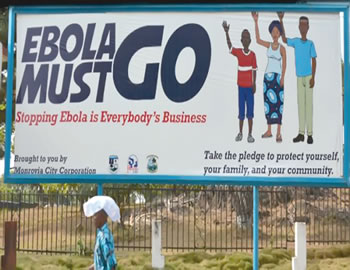
THE Alliance for International Medical Action (ALIMA), a medical charity organisation on Friday said three years after the world’s worst recorded Ebola outbreak was first declared in Guinea, hundreds of survivors who suffer from physical and mental health problems are struggling to access care.
ALIMA said no fewer than 1,100 people in Guinea survived the deadly virus, around a third of whom are estimated to suffer from depression, and four in 10 from post-traumatic stress disorder.
The organisation said most suffer physical problems, including joint pain, headaches and chronic fatigue, health. Ivonne Loua, a doctor who runs ALIMA’s survivor care programme in Guinea said, many survivors cannot afford health care.
`It is important those survivors and their families have access to quality care, because many are unable to work and cannot afford to pay their own care,” she said in a statement.
The Ebola epidemic killed more than 11,300 people and infected some 28,600 between 2013 and 2016 as it swept through the West African nations of Guinea, Sierra Leone and Liberia.
While the outbreak came under control last year, many survivors have been shunned by their families, communities, and even medical workers.
The virus can lie dormant and hide in parts of the body such as the eyes and testicles long after leaving the bloodstream, raising questions about whether it can ever be beaten, with West Africa’s 17,000 survivors acting as a potential human reservoir.
While experts say the risk of Ebola being transmitted from survivors to others is low, suspicion lingers. Almost half of the survivors that ALIMA has provided care to in Guinea’s southeastern town of N’Zérékoré said they still experienced stigma, which could worsen psychological problems.
“They are traumatised by what they experienced and overcame,” said Davin Mpaka, a neuropsychiatry’s with ALIMA. “Many feel like they have nothing else to gain from life, but they have no one to talk to about it,” he added.
Authorities in neighboring Liberia said this month they were investigating the death from childbirth of a woman named Time magazine “Person of the Year” in 2014 for her work fighting Ebola after reports that health staff were afraid to treat her.
The death of Salomé Karwah, whose sister said medics refused to touch her because she contracted the virus in 2014, has raised fears that stigma surrounding Ebola could lead to preventable deaths of survivors.
WATCH TOP VIDEOS FROM NIGERIAN TRIBUNE TV
- Let’s Talk About SELF-AWARENESS
- Is Your Confidence Mistaken for Pride? Let’s talk about it
- Is Etiquette About Perfection…Or Just Not Being Rude?
- Top Psychologist Reveal 3 Signs You’re Struggling With Imposter Syndrome
- Do You Pick Up Work-Related Calls at Midnight or Never? Let’s Talk About Boundaries






